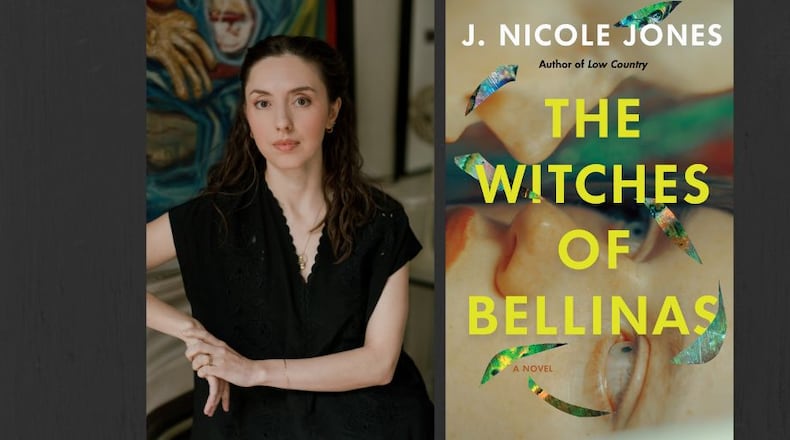Exploring the dark, fetid underbelly beneath the glossy veneer of elite communities and resorts built on privilege, affluence and beauty has become a popular trend in books and TV shows. Think “White Lotus,” “Nine Perfect Strangers” and “Big Little Lies.” There’s something perversely entertaining about rich, entitled, cosmetically gifted characters behaving badly and being forced to pay the price for it. If nothing else, it’s a comforting reminder that money and beauty can’t buy happiness, but it also shines a light on the inequities between the haves and the have-nots.
On the surface, “The Witches of Bellinas” (Catapult, $27) by South Carolina native J. Nicole Jones falls into that same category. What sets it apart, though, is that this community may be a cult, and the most egregious among its members escape comeuppance while the fish-out-of-water newcomers suffer the most.
Guy and Tansy Black have been living together for several years in New York City but have just recently married and are on their honeymoon in California. Sadly, the cracks are already showing in their union. Tansy is starved for attention and walks on eggshells in fear of irritating her husband, who’s in a perpetual state of disappointment where she’s concerned.
The last stop on their trip is the remote town of Bellinas on the northern coast of California. Guy’s beautiful cousin Mia, a former model, and her smarmy husband Manny, a billionaire wellness guru, live on a compound there with a few other equally charmed couples and their cherubic children. Seduced by the natural beauty and the warm welcome they received, Tansy and Guy impulsively accept Mia and Manny’s offer to take up residence in one of their cottages.
After a quick trip back east to liquidate their belongings, they return, eager to start afresh, but this time the Stepford Wife perfection of Bellinas begins to rub Tansy the wrong way. Every morning when she awakes, a fire burns in the hearth, and every day at 3 p.m., a rainbow stretches across the sky. Tansy struggles to fit in with the other women with their long, flowing blond hair and billowy silk gowns worn without bras or shoes. And why is it that those babies with their “too-blue eyes” never cry?
Tansy is an East Coast girl who favors sweatshirts and sneakers; she has a lot of nervous energy and plenty of opinions. She begins to chafe against Manny’s lectures on the Bohemian Club’s philosophies about patriarchy, exclusivity, femininity and entitlement, and she constantly argues with Guy, who is all in. Meanwhile, the women appear to go about their domestic duties and art projects with placid pleasure.
It’s no surprise that Tansy’s experiment in communal living takes a dark turn. When the book opens, Guy is dead and she’s hiding from the others in an abandoned schoolhouse, fearing for her life. Her story unfolds as she hurries to write it all down before she’s found.
It’s worth noting that Tansy is a frustrating narrator. She is highly attuned to Mia, Manny and Guy, and analyzes ad nauseam their every gesture, facial expression and mood. And nothing in Bellinas escapes her critical assessment, not even California’s famous weather and “the menacing perfection of another beautiful day.” If readers didn’t know going in that Tansy’s suspicions about Bellinas are grounded in truth, they might just think she’s annoying.
And yet she overlooks massive red flags, like the books related to her clandestine activities that mysteriously appear on her bookshelf, all those cups of tea that are constantly foisted upon her and those late, woozy nights she can barely remember the next day. When she’s warned to stay out of the forest behind her bungalow, you know it’s just a matter of time before she goes in.
To Tansy’s credit, no one is above reproach, not even herself. “Maybe I was the worst one of all of them,” she observes. “Taking the comforts their wealth provided, while judging their beliefs or practices or whatever.”
Still, Tansy is the hero of “The Witches of Bellinas” because she is right, having discovered the surprising secrets lurking beneath the shiny surface. It’s what she does with that knowledge that upends expectations.
Suzanne Van Atten is a book critic and contributing editor to The Atlanta Journal-Constitution. She may be reached at Suzanne.VanAtten@ajc.com
About the Author
Keep Reading
The Latest
Featured



